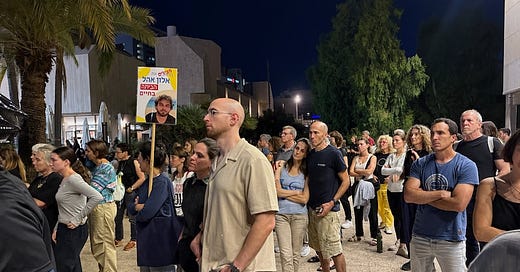DAY 597 OF THE WAR: New Humanitarian Aid Program Delayed, Opposition Grows to Appointment of New Shin Bet Head, Extension of War Blows Hole In Israeli Budget
Tel Aviv Diary, May 25, 2025
Over the weekend, Israel announced that its revised plan for the distribution of humanitarian aid in Gaza, originally set to launch today, would be delayed by several days. Meanwhile, the images emerging from Gaza are increasingly difficult to watch, and for the first time, Israeli news programs have begun broadcasting them. Coverage of the nine children killed in Gaza has been aired, though primarily framed around the army’s lack of clear explanation for the incident. Israelis are struggling to come to terms with the/growing realization that the war is claiming the lives of too many noncombatants—at a time when much of the country opposes continuing the war.
The appointment of Major General David Zini as the new head of the Shin Bet remains a major story, raising questions on multiple fronts. The process itself began with Attorney General Gali Baharav-Miara informing Prime Minister Netanyahu that, due to a conflict of interest, he could not make an appointment of a new Shin Bet Chief until a legal framework was established. Nonetheless, Netanyahu moved forward—triggering a wave of troubling revelations.
Most notably, the appointment reportedly bypassed the IDF Chief of Staff— an extraordinary breach of protocol in Israel’s security establishment—something that is simply not done. Zini has also come under scrutiny for comments made in a closed-door meeting, in which he opposed any hostage deal and stated that this is an “eternal war”—positions aligned with the far-right flank of Israeli politics. Further fueling controversy are reports his family has financial ties to the Netanyahu family.
However, perhaps most glaring is Zini’s lack of qualifications for the role. He has no experience in intelligence, no background in Palestinian affairs, and no international exposure—all considered essential for leading Israel’s internal security service.
Most observers believe Zini’s appointment is unlikely to be finalized—raising the question: why did Zini agree to be nominated in the first place, especially knowing that the move would effectively bring his IDF career to an end?
POLITICAL OVERREACH AND PROTOCOL BREACHES STIR CONTROVERSY
Two minor controversies surfaced today—though perhaps “scandal” may be too strong a word. The first centers on Defense Minister Israel Katz’s decision to block the IDF’s Chief Legal Officer from attending the annual meeting of the Israeli Bar Association. IDF Chief of Staff Zamir had approved her participation, during which she was slated to speak about her role in upholding the legality of IDF operations and defending Israeli soldiers in legal forums. Defense Minister Katz, whose primary skill appears to be political maneuvering, seemingly believes this move will curry favor for him among the far right.
The second controversy revolved around reports about Ambassador Yechiel Leiter, Israel’s envoy to Washington, who gave an interview to a PragerU podcast in which he sharply criticized left-wing Israeli politicians and denounced the prosecution of Prime Minister Netanyahu. Such overtly partisan commentary is widely seen as highly inappropriate for a diplomatic representative. Ambassadors are expected to maintain a nonpartisan stance and to refrain from political attacks against figures from their home country—especially while serving abroad.
HOSTAGES
Last night’s weekly rally in Hostage Square was marked by emotion and deep frustration. The square was once again filled with demonstrators who return week after week—many of whom feel increasingly ignored by the government.
One of the most outspoken voices among the hostage families, Einav Zangauker, spoke with a blend of raw anger and grief. Former hostage Naama Levy also addressed the crowd, sharing that during her captivity, her greatest fear was not her captors—but the possibility of being injured or killed in an IDF airstrike.
ECONOMY
Israel's Defense Budget Faces Multi-Billion Shekel Crisis as Gaza Operations Intensify
Israel's defense budget is facing a severe fiscal crisis, with spending already exceeding projections by more than 15 billion shekels in the early months of 2025, driven by renewed fighting in Gaza and massive reserve mobilizations. The budget overrun stems primarily from Operation "Gideon's Chariots," which has deployed five IDF divisions to Gaza, alongside reserve call-ups that cost an estimated 400 million shekels per month for every 10,000 soldiers—factoring in compensation, transportation, food, and logistics. Government expenditures for the first four months of the year totaled approximately 203 billion shekels—10 billion more than forecast. The Finance Ministry has warned that a prolonged conflict could drive overruns into the tens of billions, potentially necessitating spending cuts, tax hikes, or an expansion of the national deficit.
A critical factor driving up costs is the legal limbo surrounding military service extensions. Conscript soldiers whose service period is over, instead of being discharged, are currently receiving reservist-level salaries of 8,000–9,000 shekels per month—roughly triple their standard pay for the last four months of their service. This stopgap measure is in place because legislation to formally extend mandatory service by four months has stalled, amid political disagreements over ultra-Orthodox conscription. As a result, the Knesset has been unable to pass the necessary legal framework.
An urgent meeting between Prime Minister Netanyahu, Finance Ministry officials, and senior IDF commanders is expected to address the mounting fiscal strain and the need to break the legislative deadlock. The crisis underscores deeper structural challenges in Israel’s defense budget, as the military remains without the legal authority to meaningfully boost ultra-Orthodox enlistment—an issue central to long-term fiscal sustainability and one that could expose Israel to economic sanctions from Europe and Canada, further compounding financial risks.
BUSINESS
Rhino Federated Computing
Israeli Startup Raises $15 Million to Unlock Medical Data's Potential
Rhino Federated Computing, an Israeli startup formerly known as Rhino Health, has closed a $15 million Series A funding round led by AlleyCorp, with participation from new investors Wilson's Bird Capital, Frank Sica from Tailwind Capital, and Gaingels, alongside existing backers including LionBird and Fusion Fund. The company has developed a groundbreaking platform that enables secure use of medical data without exposing patients, physicians, or healthcare institutions to privacy risks. Co-founder and CTO Yuval Bar-Or, a former Google employee who worked on the Duplex project, points to a staggering opportunity: while medical data represents roughly 30% of all globally generated data, an overwhelming 97% goes entirely unused due to privacy and regulatory constraints.
Rhino's innovative solution combines Federated Learning and Edge Computing to allow AI models to train on decentralized data while maintaining strict compliance with security standards including SOC-2, HIPAA, GDPR, and ISO-27001. The platform enables unprecedented collaboration between traditionally competing entities—hospitals can work with pharmaceutical companies, and even rival drug manufacturers can collaborate on research—all without exposing sensitive data or proprietary models to one another. Since emerging publicly in 2021, the company has expanded its capabilities to include a complete library of distributed statistical tools and a GenAI-based data conversion system already adopted by Sheba Medical Center for FHIR format standardization
.
Today, Rhino serves dozens of paying customers across hospitals and health organizations in Israel, the U.S., and internationally, while also facilitating secure partnerships between academic researchers and pharmaceutical companies. The startup has recently expanded beyond healthcare into financial services, partnering with Google Cloud to detect money laundering and fraud through secure data collaboration. Founded by Bar-Or and CEO Dr. Itay Dayan, who previously led the Data Science Center at Mass General Brigham, Rhino is positioned to transform how sensitive data is leveraged across industries while maintaining the highest privacy standards.
Wix
Doubles Down on AI Design Market with Hour One Acquisition
Wix has made a strategic acquisition to accelerate its push into the AI-powered design market, purchasing Israeli startup Hour One for an undisclosed sum following the launch of its new AI image design platform, Wixell. The website-building company identified AI-based design as a key growth engine in its Q1 earnings report and is now backing that vision with concrete action. Hour One, founded in 2019, brings AI-based video creation technology that complements Wix's existing visual design capabilities through Wixell, which allows users to remove and replace backgrounds and perform other AI-powered image edits for $79 annually after 10 free daily credits.
CEO Avishai Abrahami described this as "only the beginning of a long and ambitious journey," emphasizing that breaking into the design market requires large-scale operations beyond just excellent technology. The company views Wixell as synergistic with its core business, particularly for visual assets on Wix-powered e-commerce sites, though executives don't expect immediate impacts on customer retention or revenue per user. President Nir Zohar acknowledged that AI design remains in its infancy with no clear benchmarks for business potential, but expressed confidence in Wix's ability to build sustainable business models around emerging technologies.
Despite the strategic optimism around AI initiatives, Wix's Q1 results presented a mixed picture that disappointed investors. While the company beat revenue expectations with $474 million (13% growth) and posted strong profit growth of 21%, it missed EPS estimates and issued conservative Q2 guidance below market expectations. The cautious outlook, attributed to macroeconomic uncertainty affecting business solutions, contributed to a 16% stock drop on earnings day, suggesting investors remain skeptical about the timeline for AI-driven growth to materialize in financial results.
A New Era of Clean Maritime Innovation:
Israel Launches Its First Commercial Electric Boat on the Sea of Galilee
In a historic milestone for Israel’s clean energy and maritime sectors, Francis Eco Sailing has launched Corazine—the country’s first-ever commercial electric boat—on the iconic waters of the Sea of Galilee. The launch follows the recent issuance of a sailing license by Israel’s Ministry of Transport, signaling a pivotal advancement in sustainable tourism and clean maritime technology.
While Israel has made significant strides in electrifying its roads, the country’s maritime industry has largely remained tethered to diesel-powered vessels and legacy systems. Francis Eco Sailing—a new subsidiary of the veteran maritime tourism company Francis Sailing—is determined to change that. With a mission to bring the electric revolution to Israel’s inland waters, the company aims to modernize the boating experience while minimizing the environmental footprint on one of the nation’s most cherished natural resources.
This isn’t just another boat launch—it’s a milestone for clean transportation in Israel,” said Moshe Francis, co-founder of Francis Eco Sailing and a 30-year veteran of the maritime industry. “The Sea of Galilee is a national treasure, and we believe tourism here should be part of the solution—not part of the problem. With Corazine, we are making sustainable sailing a reality.
About the Vessel … Named after the ancient village of Chorazin, located along the northern shores of the Sea of Galilee, the vessel was purpose-built to support group tourism—particularly international pilgrims—but is designed to appeal to a broad range of visitors seeking a quiet, clean, and modern boating experience.
Key Specifications:
Length: 21 meters
Width: 5 meters
Propulsion: Two electric motors, 100 horsepower each
Top Speed: 12 knots
Cruising Range: 18 hours at 7 knots
Passenger Capacity: 55 initially, expandable to 100 in future phases
Corazine is more than just a boat—it’s a floating symbol of where our industry is headed,” said Nir Lahav, CEO of Francis Eco Sailing. “It merges cutting-edge electric propulsion with zero-emission operation. No smoke, no noise, no oil in the water. Just pure, silent movement that elevates the onboard experience while preserving the natural beauty around us.
∞–––––∞–––––∞–––––∞–––––∞–––––∞–––––∞–––––∞–––––∞–––––∞
TRAVEL ACROSS ISRAEL
Jerusalem— Day 8
Our next stop in Jerusalem will be Mt Zion, located just outside the walls of the Old City near Zion Gate. I still remember visiting Jerusalem as a ten-year-old, before the Six Day War—when this was the closest we could get to the Old City itself.
Today, a visit to Mount Zion offers a uniquely rich experience, where history, spirituality, and panoramic views of one of the world’s most revered cities converge. This sacred hill holds deep significance for Jews, Christians, and Muslims, and its quiet paths echo with centuries of devotion and memory. From ancient tombs to historic churches and synagogues, Mount Zion is a place where Jerusalem’s religious tapestry comes vividly to life. Its layered past and peaceful ambiance make it an essential stop for anyone seeking to understand the spiritual and historical heart of the city.
For Christian pilgrims, Mount Zion holds profound spiritual significance. It is traditionally believed to be the site of the Last Supper, commemorated at the Cenacle—also known as the Upper Room. Though largely a medieval reconstruction, this space resonates with centuries of devotion and the enduring echoes of Gospel narratives. Just steps away stands the Dormition Abbey, a striking basilica built by German Benedictine monks to honor the belief that Mary, the mother of Jesus, fell into eternal sleep at this very spot. With its graceful architecture, soaring domes, and serene interior, the church offers a tranquil haven for prayer and reflection amid the timeless landscape of Jerusalem.
Jewish visitors are often drawn to the traditional Tomb of King David, located on the lower level of the same historic complex. While the site’s historical authenticity is debated among scholars, it remains a place of deep reverence—especially for religious Jews—and continues to serve as an active site of prayer and pilgrimage. The adjacent courtyards and study halls often hum with the rhythmic voices of scholars immersed in sacred texts and worshippers engaged in heartfelt devotion.
Beyond its religious landmarks, Mount Zion offers sweeping, panoramic views of Jerusalem’s eastern skyline—including the Mount of Olives, the Kidron Valley, and the ancient City of David. It’s an ideal vantage point to pause, absorb the sacred geography, and reflect on the powerful convergence of past and present. Whether you come as a pilgrim, a history lover, or a curious traveler, a visit to Mount Zion is a journey into the heart of Jerusalem’s enduring spiritual and cultural legacy—a place where stories etched in stone continue to inspire across generations.
Today’s Zoom Briefing:






